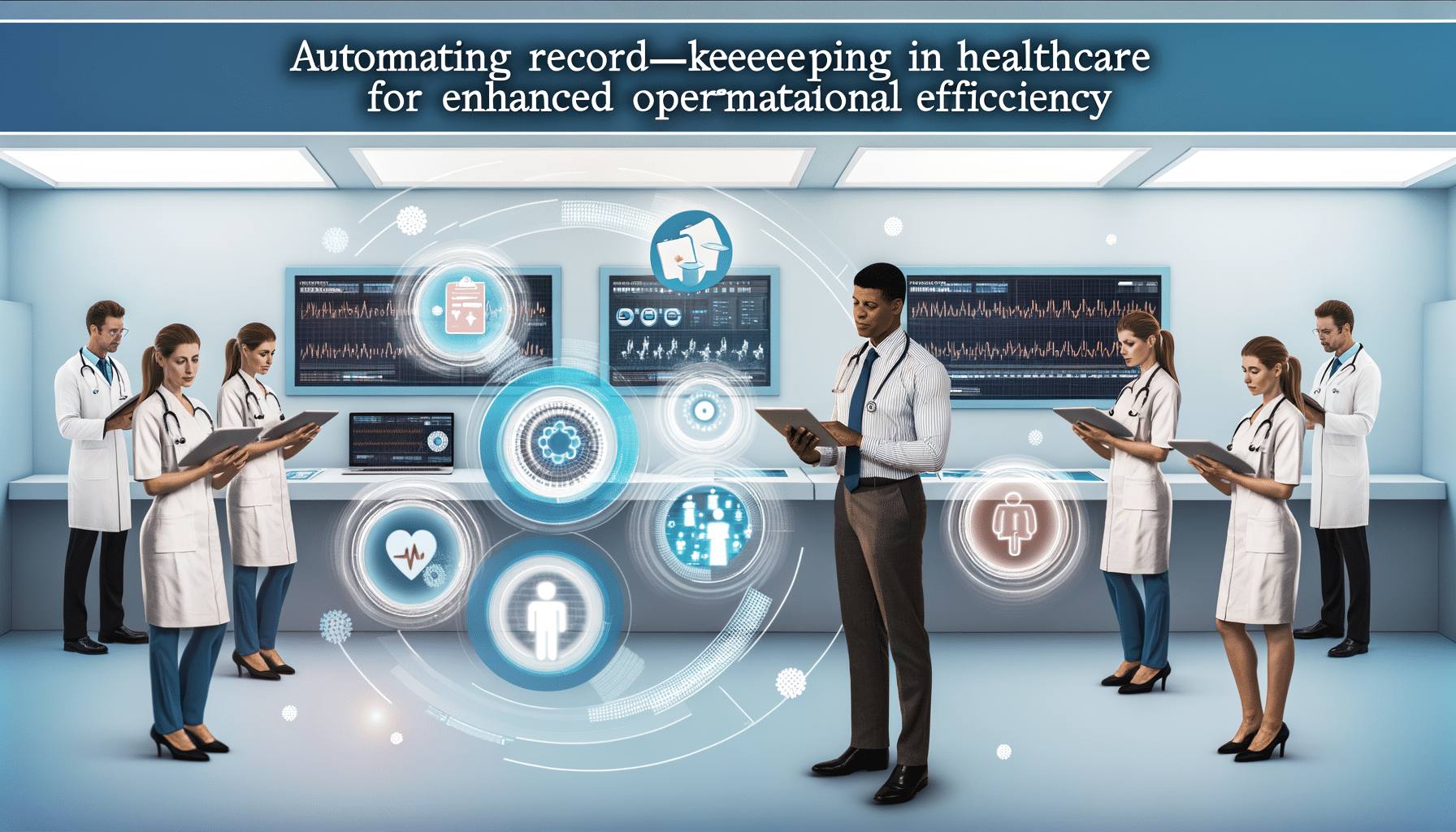- Operational Efficiency
- October 20, 2023
Automating Record-Keeping in Healthcare for Improved Operational Efficiency

Introduction
In a world where data is at the helm of decision-making, the healthcare industry faces an inherent challenge: managing an overwhelming volume of records while ensuring accuracy, ease of access, and compliance. As healthcare providers, administrators, and IT professionals know, this is no small feat. Yet, a transformative wave of automation is making it all possible. Let me take you on a journey where automation not only bridges the gaps in the traditional record-keeping processes but also fosters an environment ripe for operational efficiency.
The Unique Demands of Healthcare Records
When I first encountered the world of healthcare records, the complexity was staggering. For clinicians and administrators, the demand is to juggle patient confidentiality, regulatory compliance, and quick accessibility—all simultaneously. Records, ranging from patient histories to insurance claims, demand meticulous management. The staff is often sidetracked by manual processes, wasting resources that could be better spent on direct patient care. This is where automation comes into play.
Why Automation is the Game-Changer
Automation, quite simply, transforms the healthcare record efficiency. Here’s how:
- Structuring and Categorizing Records: Automation allows healthcare records to be categorized automatically. Leveraging sophisticated AI algorithms, each document is tagged and organized intuitively, making retrieval as simple as a natural language query.
- Error Reduction: One of the greatest advantages of automation is its precision. Human error, especially in data entry, can have serious implications in healthcare. Automated systems mitigate these risks by maintaining consistent and error-free records.
- Regulatory Compliance: The landscape of healthcare is replete with regulations—HIPAA, GDPR, and others. Automation ensures that workflows are in compliance by default, greatly reducing the burden on staff to manually check these complex requirements.
- Swift Data Retrieval: Gone are the days of sifting through stacks of paperwork. Automated systems can fetch a patient’s history or an insurance document within seconds, drastically slashing down on the time invested in manual lookups.
Implementing Automation in Healthcare
During the development of RecordsKeeper.AI, we focused on how to embed automation into existing health systems universally. Here’s what I realized is crucial for a successful implementation:
- Integration with Existing Systems: The automation tools must integrate seamlessly with electronic health records (EHR) and other management systems in use. Maintaining information flow without disruption is critical.
- Training and Support: While automation simplifies processes, education around new systems helps ensure a uniform staff adoption rate, optimizing the value automation promises.
- Security and Privacy: With sensitive health data involved, automated systems are developed with enhanced security protocols, employing encryption and blockchain technology to guarantee tamper-proof, immutable records.
The Future is Here: A Healthcare System Fueled by Automation
Healthcare’s adoption of automation is not just a dream of a paperless environment but a strategic move toward operational efficiency. The system’s capabilities pave the way for clinicians to spend more quality time with patients, promoting improved outcomes and a higher standard of care. Administrative overheads lessen as daily record-keeping is reduced to supplementary tasks.
The results have far-reaching effects: patients feel attended, and practitioners can rely on the accuracy and availability of information without a second thought.
Conclusion
As automation begins to reshape the healthcare landscape, I am enthusiastic about the breakthrough in record management that RecordsKeeper.AI presents for this industry. By employing automation, healthcare facilities can reduce wasteful processes and focus on enhancing the core of healthcare—patient well-being.
For those eager to dive deeper into the potential automation holds, I encourage reaching out to explore how RecordsKeeper.AI can be the perfect partner in transforming your record-keeping system. Let’s embrace the future with confidence and transform challenges into opportunities for efficiency and growth.
Remember, this transformation doesn’t just pertain to healthcare but signals a broader horizon of technological evolution—one that I am honoured to be part of. If you want to hear more about my journey, follow along and let’s innovate together!
Toshendra Sharma is the visionary founder and CEO of RecordsKeeper.AI, spearheading the fusion of AI and blockchain to redefine enterprise record management. With a groundbreaking approach to solving complex business challenges, Toshendra combines deep expertise in blockchain and artificial intelligence with an acute understanding of enterprise compliance and security needs.
Archives
- January 2025
- December 2024
- November 2024
- October 2024
- September 2024
- August 2024
- July 2024
- June 2024
- May 2024
- April 2024
- March 2024
- February 2024
- January 2024
- December 2023
- November 2023
- October 2023
- September 2023
- August 2023
- July 2023
- June 2023
- May 2023
- April 2023
- March 2023
- February 2023
- January 2023
- December 2022
- November 2022
- October 2022
- September 2022
Want to get more content like this?
Signup to directly get this type of content to your inbox!!
Latest Post
Document Control for Equipment Maintenance
- January 20, 2025
Managing Records for Multiple Clients
- January 19, 2025
Handling Conference Documentation
- January 18, 2025
Setting Up Department Record Reviews
- January 17, 2025





